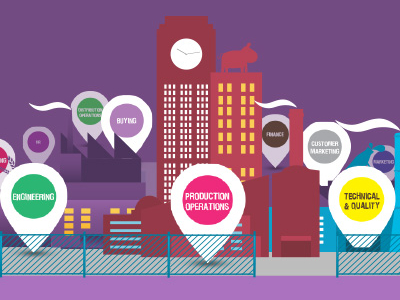What’s it all about then?
As a Systems Development Manager working in a food company you’ll be responsible for improving the company IT systems and incorporating new technology as required.
These improvements mean updating current IT and also producing, installing and implementing new computer systems, networks and related software.
You’ll also advise and recommend improvements for future IT developments.
What might I be doing?
This depends on the food company that you’ll be working for but the following duties are likely to be common no matter where you’re employed:
- Analysing current IT systems and identifying improvements
- Writing software and developing technical specifications and operating manuals
- Testing company IT systems to ensure effective operation
- Training IT users and providing ongoing systems support
- Diagnosing faults and making repairs as necessary
- Liaising with IT team colleagues and also other company staff
- Fault finding, diagnosing and making repairs as required
- Investigating, recommending and implementing new computer systems
- Coordinating IT systems compatibility throughout the company
- Working with 3rd party IT suppliers
What will be expected of me?
You’ll obviously need to have extensive knowledge of IT systems and have a high degree of technical skill; it will also be important to keep updating this knowledge so that you remain right on top of all new developments in IT
As well as this you’ll need to be able to communicate this knowledge to others who are not as technically adept as you are.
You’ll need to be creative, analytical and organised and have a high level of attention to detail, being able to solve problems quickly and effectively.
In more general terms you will also need to be a good team worker and someone who stays on top not only of IT developments but also food industry specific changes and how these affect the role of IT systems developer.
What can I expect?
Working hours are typically 9am to 5pm. However, longer hours are necessary towards the end of projects, as deadlines approach, and also during the testing stage so the system can be tested when it's not being used.
In some cases, systems developers may be required to be on call to deal with problems. This can involve evening and weekend work in a shift pattern.
The work is mainly office based or in computer laboratories, although full or part-time remote working is becoming increasingly common.
What qualifications do I need to get in?
Although this area of work is open to all graduates, applicants will be expected to have some technical ability. The following subjects may increase your chances:
- Computer Science
- Information Systems
- Computer software/computer systems engineering
- Electronics
- Maths
- Physics
You may also need the following attributes:
- Extensive knowledge of data processing, hardware platforms, and enterprise software applications.
- Technical experience with systems networking, databases, Web development, and user support.
- Good background in Data Base design in Microsoft SQL and Access.
- Background in Microsoft .NET, Visual Basic, Excel, Word, Outlook and HTML.
- Good working knowledge skills with Microsoft Office Products, Microsoft Visio, and Microsoft Project.
- Working knowledge of Citrix Metaframe XP, Blackbaud Raisers Edge and Financial Edge would be an asset
- Strong project management skills with effective results focus within an information systems environment.
- Strong analytical and problem solving skills.
- Experience in the development and implementation of standards, procedures and guidelines to support operational processes.
- Self-motivated with the ability to prioritize, meet deadlines, and manage changing priorities;
- Proven ability to be flexible and work hard, both independently and in a team environment, in a high pressure on-call environment with changing priorities.
- Willingness to work occasionally outside of normal business hours.
- Excellent English oral and written communication skills.
- Post-secondary degree in computer science or related field or a combination of related experience and education.
What about further training?
It is vital to keep up to date with changes and developments in the industry, which may involve using your initiative and taking responsibility for updating your technical skills and knowledge.
Large, graduate employers often offer a structured programme where you will gain experience in a number of team-related projects in different work areas. Most companies offer ongoing training, either in-house or via external courses.
There are different levels of systems developer, and promotion is usually dependent upon both ability and experience.
Graduates in non-computer-related subjects may consider taking a postgraduate IT conversion or technical postgraduate course. Many employers will also look for evidence of continuing professional development outside of the classroom and project programming experience can prove good evidence during the application process to show that a candidate is technically skilled but also has effective problem-solving skills.
Anything else I might need to know?
There are excellent promotional prospects for employees willing to move into managerial positions or to change job regularly.
Job titles and descriptions in IT are not standardised. Systems developers may be called systems programmers, engineers, or web developers. The work of a systems developer can also form part of a software engineer or multimedia programmer's role.
 cy
cy





